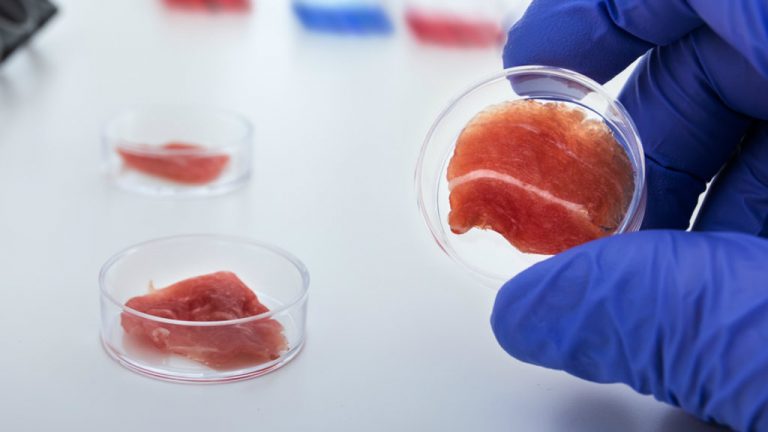On Thursday, JBS’s subsidiary, Bio Tech Foods, announced they are going to build a commercial size cell cultured meat plant in Spain. The Brazilian meatpacker’s subsidiary said the investMEAT project, focused on research in cell lines, cultured media and biomaterials that allows scaling up cultivated meat production to the industrial level, has just obtained the support of the Spanish Institute for Foreign Trade (ICEX).
The JBS press release added, “In this line, the project led by BioTech Foods, ‘Research on cell lines, cultured media and biomaterials for their correct bioprocessing to enable the production of cultivated meat’ (investMEAT)’ will allow a highly efficient cultivated meat production line, which will solve the challenges of current technology linked to scalability.”
The factory, which JBS says will be the world’s largest lab-grown meat plant, should produce more than 1,000 metric tons of cultivated beef per year, JBS said. It said it could expand capacity to 4,000 metric tons per year in the medium term.
The news broke during the Wyoming Stockgrowers Association annual meeting in Riverton. NCBA President Todd Wilkinson was present at the meeting and told Northern Ag Network’s Andy Schwab this is one of the biggest issues facing the cattle industry.
“We’ll gladly compete against that, but the consumer needs to know at the counter what they’re buying,” said Wilkinson. He added his concerns that happened to the milk industry when imitation products filled the shelves. “I just don’t want the beef industry go by way of what happened to milk and lose the ability to identify our product as unique and natural,” Wilkinson added.
He also highlighted a recent study that the global warming potential of lab-based meat using these purified media is four to 25 times greater than the average for retail beef. “They can say that it’s designed to feed the world, but it’s feeding the world a non-natural product and it’s a product that is going to require more energy to produce, and don’t tell me it’s sustainable,” said Wilkinson.
The state of art plant is aiming for mid-2024 launch.
####
Northern Ag Network – 2023



Lab-Grown Meat Suffers Significant Setback With Shocking New Scientific Findings
https://dailysceptic.org/2023/06/18/lab-grown-meat-suffers-significant-setback-with-shocking-new-scientific-findings/
Earlier this year, the Grocery Gazette reported that the UK was set to be a world-leading developer of lab-grown meat. In the recent past, Guardian climate hysteric George Monbiot claimed lab-grown food “will soon destroy farming – and save the planet”. Alas, such boosterism is being challenged by hard facts. Lab-grown meat is up to 25 times worse for the environment since it needs ‘pharmaceutical-grade’ production to make it fit for human consumption. In particular, there is a need to remove endotoxin from the cultured mix, a substance that in concentrations as low as one billionth of a gram per millilitrie can reduce human IVF pregnancy success rate by up to four fold. These are the startling conclusions of ground-breaking work recently published by a group of chemists and food scientists from the University of California. It turns out that ‘pharma to food’ production is a significant technological challenge. The major problem with lab meat is that it uses growth organisms that have to be highly purified to help animal cells multiply. Compared with environmental savings on land, water and greenhouses gases, the whole bio-process is noted to be “orders of magnitude” higher than rearing the actual animal. “Our findings suggest that cultured meat is not inherently better for the environment than conventional beef. It’s not a panacea,” said co-author Edward Spang, an associate professor in the Department of Food Science and Technology. The study found that even across scenarios using lower pharma standards, efficient beef production outperforms cultured meat within a range from four to 25 times. This suggests that investment to advance more ‘climate-friendly’ beef production may yield greater reductions in emissions.[…] The route to New Zero is littered with improbable technologies that promise much – and give endless opportunities for virtue signalling – but deliver little. While many countries press ahead with plans to destroy conventional animal husbandry, the options for new ways of actually feeding populations look thin on the ground. To be fair to Monbiot, he has picked up on the problems of lab meat, noting in a recent blog post that “the more I’ve read about cultured meat and fish, and the more I’ve come to appreciate the phenomenal complexities involved… the more I doubt this vision will come to pass”. Always the worrier, Monbiot asks, “How can mass starvation best be averted”? Not removing the 337.18 million tonnes of global meat production in favour of flaky factory solutions might be a start. (cont’d) […]” |